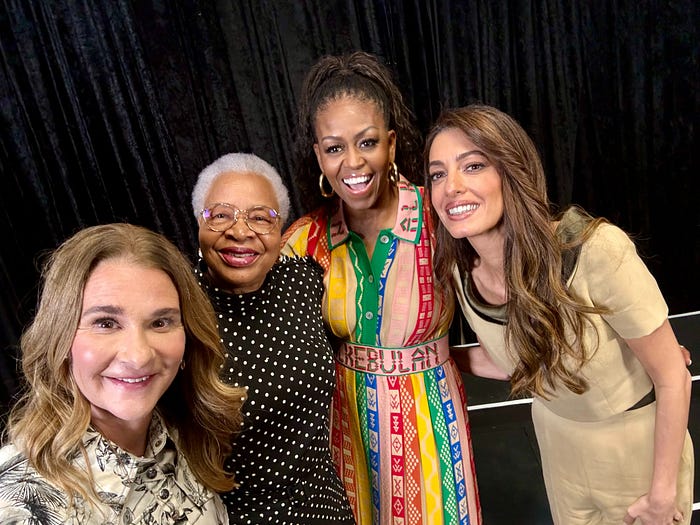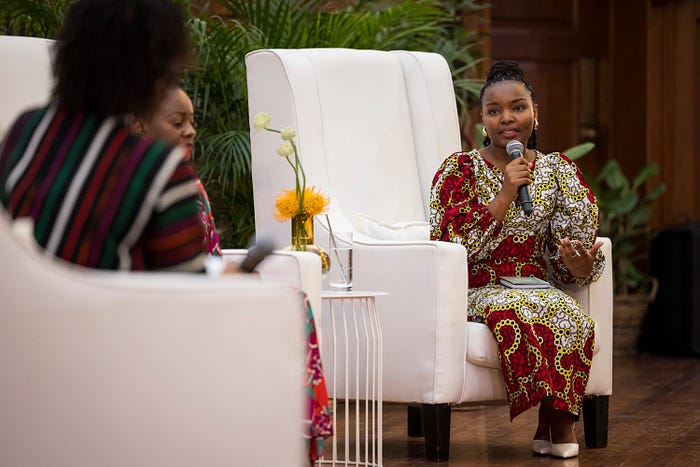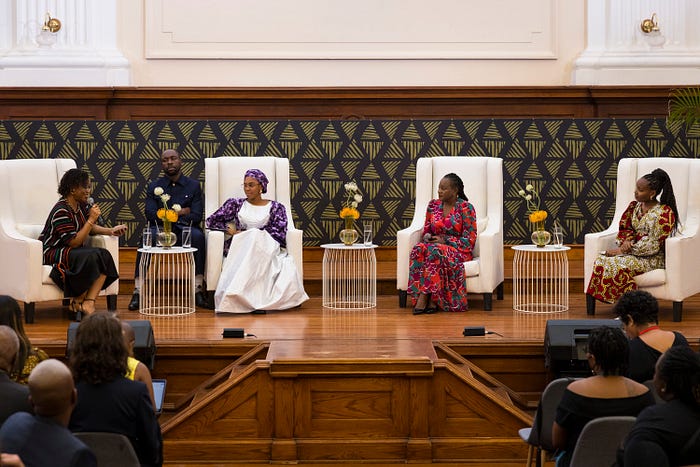On the Day of a Girl Child, 11th October, I received a message from Girls Not Brides, inquiring if I am available to speak during the visit of Michelle Obama, Melinda French Gates and Amal Clooney in Cape Town, South Africa. I confirmed availability, and started weeks long of preparations and back and forth meetings with the staff of the 4 organizations (Girls Opportunity Alliance, Girls Not Brides, Gates Foundation and Clooney Foundation for Justice)

Photo: The Obama Foundation
Fast forward, the day arrived, we were in a room full of formidable women and young women across Africa, to reflect on the issue of ending child marriages. Building from the best practices in SADC countries, like the presence of SADC Model Law on Eradicating Child Marriages, engagement of traditional leaders in countries like Malawi, presence of strong in country infrastructures like community leaders, national networks which mobilize collective support and provide both prevention education to communities and response support to survivors of child marriage violence.

Photo: The Obama Foundation
During the Ending Child Marriage conversation, I was asked to share our experience in using the power of the law to address child marriages, also how do we reconcile the tension between girls who sometimes don’t want to take punitive measures towards their families, and the need for gender-sensitive rule of law?
First of all, it is important to remind ourselves that child marriage is a human rights violation and is both a cause and effect of exclusion from education. It sustains elevated rates of teenage pregnancy, HIV, and GBV with long-lasting and devastating consequences for the girls & their children later in life.
Legal framework is critical in setting standard for what is allowed and what is not, define the crime and provide legal remedies and redress for victims of child marriages.
However, alone is not enough, it has to be coupled with pedagogical pursuit for it to be effective and bring lasting change.
But, it is a proven fact, where law banning child marriages is not available, access to justice for survivors is a nightmare and encourages disempowering narratives.
On the second part of the question, personally, I feel the term reconciliation, many times is used to deny girls justice.
Girls shouldn’t bear the burden of reconciling communities which have failed them at first place.
The tension between the need to reconcile families and enforcing laws on gender based violence, exists because of lack of EMPATHY on girls’ issues and VICTIM BLAMING which many times fuel non-reporting of child marriages cases instead of ending the practice.
Many times people who ask that question, do so, not because they feel empathetic about issues girls and women face on the daily basis, the exclusion, violence, marginalization etc, rather, they do so expecting girls to continue to be obedient of the system even when their rights are violated.

Photo: The Obama Foundation
So, what can we do to enhance understanding and supporting girls to continue standing up and speaking out for their rights against violence??
- Work with girls and communities using gender transformative approach, to understand; Power relations, socialization and interests and how they disadvantage girls. It is important for community to understand how to treat girls’ issues with empathy and focus the blame on perpetrators instead of blaming and shaming survivors of violence.
Msichana Initiative work with communities in Tanzania so they can champion actions in defending girls’ rights, as a result perpetrators are held accountable by the communities and community become a safe space for girls.
- Investing in survivor centered access to justice which support re-integration of girls to the community, so girls do not feel guilty and ashamed for standing up and defending their rights.
By not supporting survivor centered response,we become complicit with the system which perpetuates violence for girls and girls will continue to be blamed and shamed for seeking justice.
example: through the organisation I am leading, we support girls to go back to school and engage in income generating activities. So they feel the power of standing against violation of their rights.
We Support girls led group, so girl can learn together how to turn their vulnerability into leadership. The groups create a support system and community of change, which in turn encourage girls to stand up and speak out for their rights without fear of isolation. We have curated 20 out of school platforms, reaching more than 500 girls in Kongwa, Nzega, Bagamoyo and 5 districts in Dar es salaa. We also coordinate safe spaces for girls in school, called One Girl + which engage more than 1000 girls on an annual basis.
It is crucial to remember, rights are things we fight for,repoliticing the violence girls and women face is critical if we are to end it, and here I would like to quote the late Prof. Wangari Mathai
“Human rights are not things that are put on the table for people to enjoy. These are things you fight for and then you protect”
Like the famous Nelson Mandela’a quote, where he said “ Courage is not the absence of FEAR, but triumph over it”.
The transformation we seek, needs everyone of us to be courageous and consistently demanding better for girls in our communities. Our hope is in everyone of us, proximate to the problem and relentlessly agitating for the solutions.
